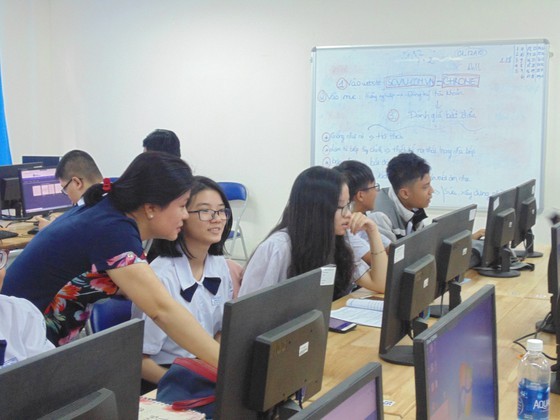
Under the project, high school students must grasp computer skills - abilities and knowledge which allow them to use computers and related technology. From 2021 to 2022, 90 percent of students in national-level high schools must master computer skills and 30 percent of them get international certificates of computer technology.
Additionally, 40 percent of students in normal high schools acquire computer skills and 20 percent of them get international certificates of computer technology.
With regard to teaching staffs, 80 percent teachers are able to provide knowledge of computer technology and most of schools in the city have laboratory rooms.
According to the project, most of students of national-level high schools learn computer technology and half of them get international certificates while 50 percent of students in normal high schools learn the important technology and 30 of them obtain international certificates for the 2023-2025 period.
From 2025 to 2030, most of students of national-level high schools learn computer technology and 80 percent of them get international certificates while 80 percent of students in normal high schools learn the important technology and half of them obtain international certificates.
The city's state budget and social contributions will cover the project implementation.
Beforehand, the Department of Education and Training in HCMC announced the computer technology will be officially included in the new education program and primary students will learn it; therefore, investment in laboratory rooms in schools for teaching the subject is necessary for the upcoming time.
Especially, from 2014 until now, schools have piloted teaching computer technology following Internet and Computing Core Certification Spark, one of the most popular certifications used in elementary and middle school computer classes and MOS which had been recognized by the Ministry of Information and Communications and the Ministry of Education and Training.
The IC3 Spark exam is a digital literacy certification designed to familiarize young students with technology related to the Internet, computers, and digital citizenship.
Primary schools in the southern metropolis are using teaching and learning materials including Practicing computer technology with IC3 Spark, Fahasa-published IC3 Spark.
Apart from that, junior high schools have been using material Internet and Computing Core Certification (IC3) in addition to other normal textbooks. Students at senior high schools must learn two periods of computer technology as per the direction of the Ministry of Education and Training. Some schools even have curriculums of computer technology according to Microsoft Office Specialist’s material.
The Department of Education and Training said that teaching and learning the computer skills are considerably based on parents’ consensus and students’ interest. In the academic year 2018 - 2019, roughly 410,579 of 434 primary schools in the city were taught the technology and most of high schoolers were taught the subject. However, the program has not satisfied students’ demand.
Despite difficulties along the way, after four years of the program implementation, 4,524 primary students have got IC3 Spark certificates, 280 junior high schoolers scooped IC3 certificates and 10,277 senior high schoolers achieved MOS certificates. Moreover, many students won prizes in the national and international examinations; subsequently, they were admitted in universities without sitting for examination and later received scholarships from famous schools in the world for further studying abroad.






















